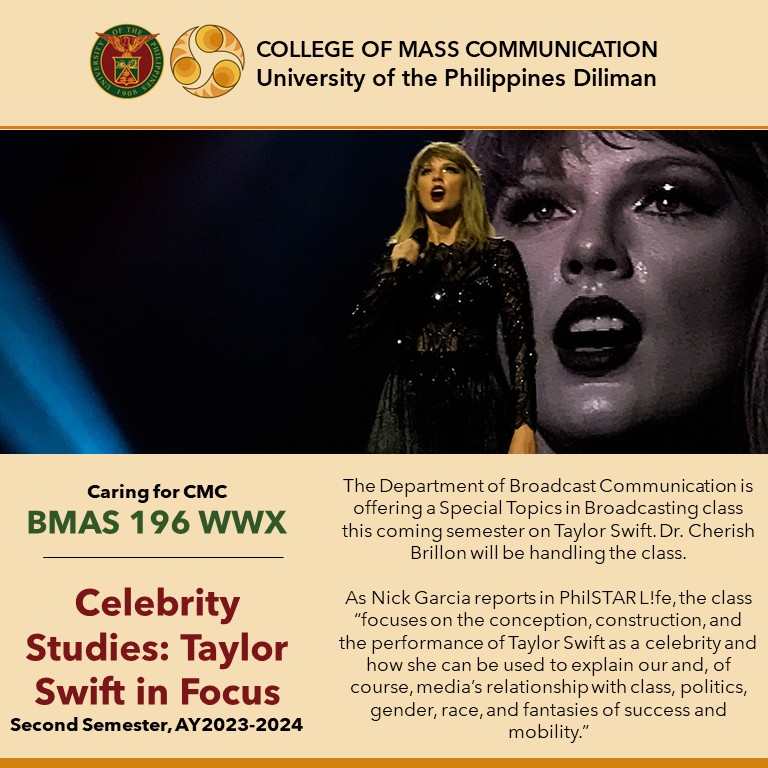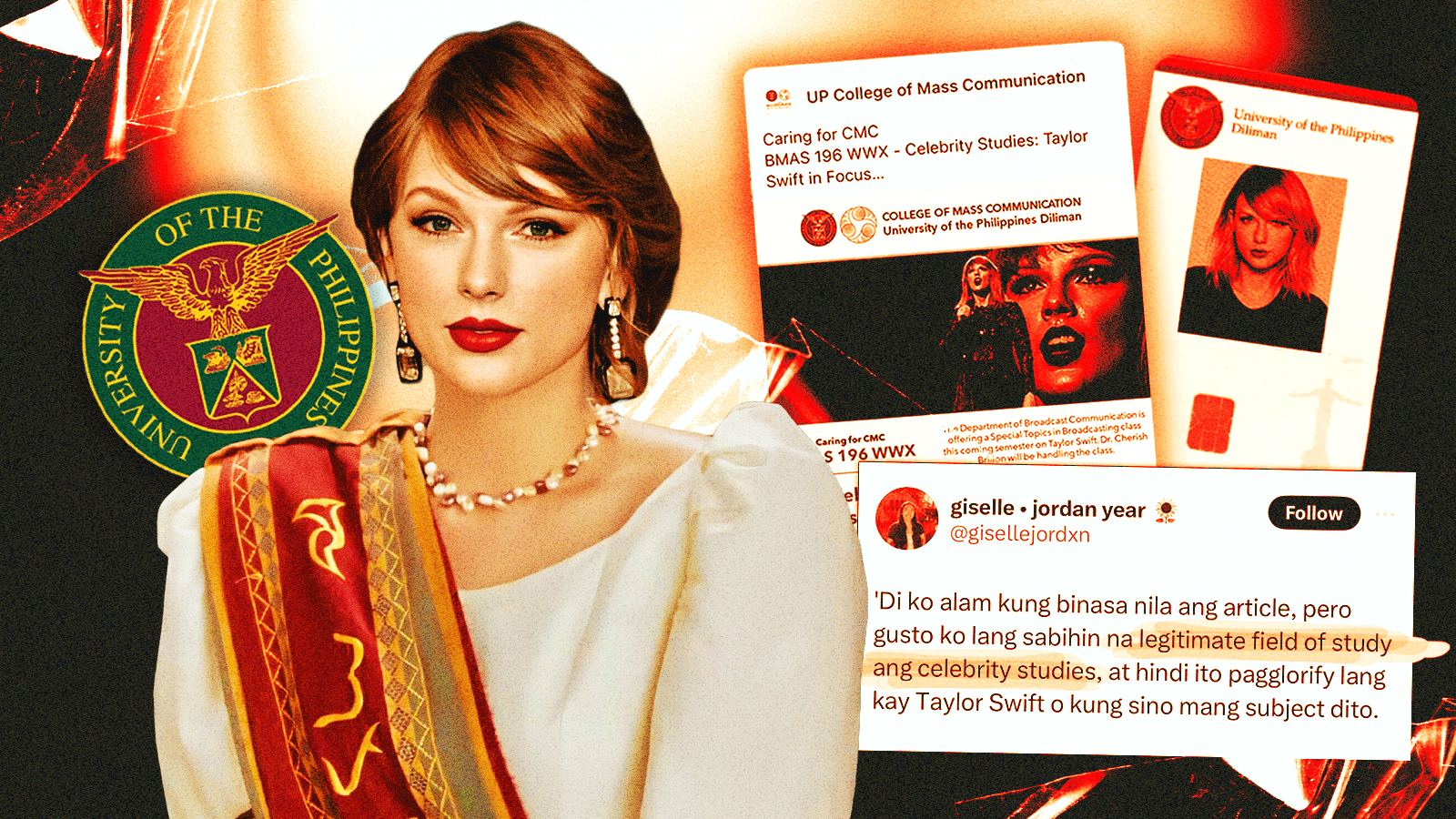Here’s an idea, let people who want to try UP Diliman Communication elective all about Taylor Swift try it and not make a big deal about it.
Related: 14 Interesting Courses You Didn’t Know Are Being Offered In The Philippines
The University of the Philippines – Diliman now joins a handful of universities abroad offering college courses all about singer-songwriter and superstar Taylor Swift. A first in the country, the university’s College of Mass Communication is launching the class BMAS 196 WWX – Celebrity Studies: Taylor Swift in Focus this second semester of AY 2023-2024, to be handled by Dr. Cherish Aileen Brillion.

FB/UP College of Mass Communication
Upon its announcement, people took to social media to share their opinions about the class. Responses ranged from enthusiasm to “What a waste of taxpayers’ money!”, and it’s fascinating to bear witness to the discourse surrounding one class with probably less than 50 slots about one celebrity. As some opinions leaned towards being skeptical and dismissive of the value of studying Swift and popular and celebrity culture, counterarguments emerged that shed light on the nuance and potential the fields of communication and social science have.
THE DIVERSE FACETS OF COMMUNICATION AND MEDIA STUDIES
a lot of (potential and existing) researches in comm is the power/rhetoric of public figure to empower/disempower, based on the way they present themselves, the way they are portrayed in the media, the way they make statements and so much more.
— Drixter (@drixteraustin) January 11, 2024
A prevalent perspective that underpins some of the hot takes about the Taylor Swift course on social media is that it’s not valuable enough to study—why waste your time and resources on a course about a celebrity? It’s also popular thought that entertainment, pop culture, and celebrity are simply “fluff,” areas of humanity and study that are deemed “less important” than medicine or engineering.
Any metric or hierarchy will be subjective, but are areas of learning truly better or more important than others? They serve different purposes, and comparing the values of fields of study is far less productive than valuing them all. Students, however, are right to defend the value of such a course and argue against the underappreciation of communication and media studies and propagation of stigma regarding the social sciences. The open disrespect for communications as a field of study is frankly disgusting.
ok going back to this to say that we REALLY really have to stop creating stigma against communication (and other humanities and social sciences) programs
— aly! ଘ(*. .)੭ 🇵🇸🇨🇩🇸🇩🇱🇧🇵🇭 (@theblessedbhie) January 12, 2024
may purpose po ang media studies! tama na ang STEM superiority complex https://t.co/RBeijXSGXh
The course itself is clearly not a class simply to glorify or fangirl over Taylor Swift. As stated, it’s about “conception, construction, and the performance of Taylor Swift as a celebrity and how she can be used to explain our and, of course, media’s relationship with class, politics, gender, race, and fantasies of success and mobility.” Exploring the hows and whys of cultural and societal phenomena isn’t just about academic posturing, either. Concepts in communication and media studies are multifaceted, and studies can be used to explain or expound on other concepts and phenomena in society and culture. Taylor Swift’s career and character in this case is just a means to explore broader topics relevant to society.
Given that entertainment, pop culture, and celebrity all involve psychology, sociology, culture, and communication, we ask the question: are topics involving media, pop culture and celebrity not valid areas of study? They are, if numerous studies and journals about the psychology, sociology, and communication involved in popular culture have anything to say about it.
'Di ko alam kung binasa nila ang article, pero gusto ko lang sabihin na legitimate field of study ang celebrity studies, at hindi ito pagglorify lang kay Taylor Swift o kung sino mang subject dito. https://t.co/GbaiA7kAoB
— giselle • jordan year 🌻 (@gisellejordxn) January 11, 2024
ELECTIVES ARE GREAT, LEARNING IS GREAT
Many of the arguments presented against the course insists it’s a waste of a degree. To clear up any confusion, the course is simply an elective—a subject an enrolled student can take voluntarily. “Course” is not synonymous to program, which some people have mistaken it was. Electives allow students to have the freedom to explore other areas of study and topics that don’t necessarily fit into their program. Some of my own favorite classes have been electives, and I know of so many people whose passion for learning was rekindled because of an elective.
also, the said course does not glorify TS as well, it examines how culture, power relations, and her fame interconnect.
— nikoru (@chckncl) January 11, 2024
Of course, the criticism about Taylor Swift, whether it’s related to her white feminism or her silence about relevant social issues despite her massive platform, as well as the criticism about people preferring to study about an American pop star rather than any other more contextually-aligned subjects, are all valid takes. Hopefully, those get discussed in the class, too.
What this allows room for, though, is an exploration of what else could we study, what else can we learn from, and how can we learn about them in a way that’s as engaging and discussion-provoking as a Taylor Swift course?
And to that end, why shouldn’t we encourage the promulgation of opportunities to learn? While school and studying have their negative connotations due to the way our education system and society itself favors performance and career security over learning, should we not push for more avenues to learn and encourage enthusiasm in learning? Why already decide it’s a waste of time and resources when a) the Taylor Swift course is just an elective, b) you’re not the one taking it, and c) it clearly desires to explore the bigger picture involving culture and society? It’s up to us how we use what we learn, or how we value it, but no pursuit of learning is ever a waste of anything.
Taylor Swift edit in thumbnail by birdsoftay.
Continue Reading: 6 Fields You Can Enter With A Communications Degree





